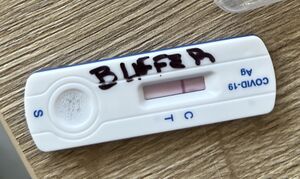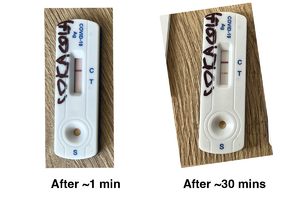How do controls on antigen COVID tests work?
| Project Infobox | |
|---|---|
| Self researcher(s) | Paulina Ejsmont, Maira Goytia, Tim Dobbs, Yann Huon de Kermadec, User:Gedankenstuecke |
| Related tools | COVID tests |
| Related topics | |
Builds on project(s) |
|
| Has inspired | Projects (0) |
There are a large number of different rapid COVID tests, both for professionals but also for self-testing at home. Beyond the actual test indicator (shown by the T line on the test), these tests also contain a control indicator (shown by the C line on the test) that should appear regardless of whether COVID was detected or not.
During the self-research chat on April 28 the question of how these controls work came up. Do they indicate that the person taking the test did correctly swab their nose to take a sample? Or do they only indicate that the test itself was correctly loaded and that liquid is present?
After discussing this question over lunch at work, we decided to solve this question by doing two small experiments using regular COVID tests for home-use and loaded these in different ways to observe what would happen.
Experiment #1: Loading the test with only the provided buffer liquid[edit | edit source]
Reasoning[edit | edit source]
If the control on the rapid COVID test were to identify that the user correctly swabbed their nose, it should detect some molecules that are universally present in the human nose. Conversely, in this case the control line should not appear if the test is only loaded with the buffer liquid that is part of the test kit without having performed any swabbing.
Test[edit | edit source]
To test this, we loaded a antigen COVID test using only the buffer liquid without performing any swabbing.
Result[edit | edit source]
Within a few seconds after loading the test the control line appeared. The control line that appears on a rapid COVID test does not indicate that one has correctly taken a sample, it only indicates that one loaded the test correctly.
Experiment #2: Loading the test only with Coke Zero[edit | edit source]
Reasoning[edit | edit source]
We also had heard that kids are using sodas such as Coca Cola to turn their rapid COVID tests positive to not have to go to school. In good research fashion we decided to skip the literature research (which would have shown us that this is indeed the case[1]) and immediately proceeded to testing whether this works.
Test[edit | edit source]
We loaded an antigen test only using a few drops of Coke Zero and observed which of the control & test lines would appear over time.
Result[edit | edit source]
As for the first experiment, the control line appeared within a few seconds. When revisiting the test strip after 30 minutes, the test line also appeared, giving the wrong indication of a positive test. Apparently, this is due to the acidity of the soda, which leads to the false-positive result[1]. In contrast, the pH of the buffer solution would be at around 8.

